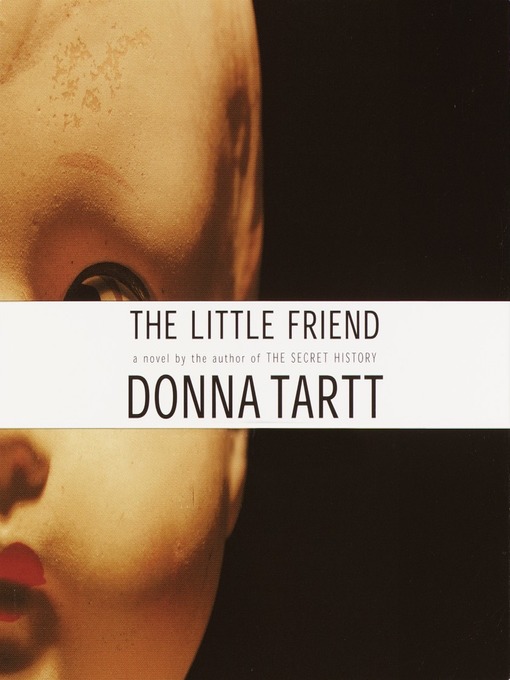
The Little Friend
کتاب های مرتبط
- اطلاعات
- نقد و بررسی
- دیدگاه کاربران
نقد و بررسی

During the last summer of her childhood, Harriet Cleve Dufresne resolves to find out the answer to the biggest question in her young life: Who hanged her brother dead from a tupelo tree in the front yard when she was just a baby--and why? At first, it sounds as if Donna Tartt's decision to narrate her long-awaited second novel might not have been a good one; her complex writerly sentences demand narrative expertise for her story to sound told rather than read. But in the end, she won over this listener--not just with the charm and appropriateness of her Mississippi accent and intonation--but with the deep affection she gives to a full spectrum of contemporary Southern characters: eccentric middle-class whites, steeped in family mythology of times passed and still mourning the loss of gentility; the working-class blacks whose lives are intertwined with them in complex economic and personal relationships; and dope-dealing, trailer-living rednecks, as resentful and up to no good as any of Faulkner's poor white trash. Tartt narrates as if she's known these people all her life. Her portrayal of Harriet--fierce, precocious, bookish and as likable as Scout Finch--is especially apt. E.K.D. (c) AudioFile 2002, Portland, Maine

Donna Tartt's long-awaited second novel is a sensually and psychologically rich tale of place and childhood. Harriet Dufresne's world changed forever the day someone murdered her 9-year-old brother, Robin. Ten years later, as a precocious and prickly 12-year-old, Harriet decides to solve the murder. Her Mississippi world is peopled with vivid characters and shot through with class and racial tensions, and Tartt has not forgotten how to tell a story, but Karen White's performance is dispiriting. Not a word is spoken badly, but White applies pauses and emphases to each sentence in a monotonous rhythm, ignoring meaning or sense. This reader had to revert to the printed book. B.G. (c) AudioFile 2003, Portland, Maine

Starred review from September 9, 2002
Widely anticipated over the decade since her debut in The Secret History, Tartt's second novel confirms her talent as a superb storyteller, sophisticated observer of human nature and keen appraiser of ethics and morality. If the theme of The Secret History
was intellectual arrogance, here it is dangerous innocence. The death of nine-year-old Robin Cleve Dufresnes, found hanging from a tree in his own backyard in Alexandria, Miss., has never been solved. The crime destroyed his family: it turned his mother into a lethargic recluse; his father left town; and the surviving siblings, Allison and Harriet, are now, 12 years later—it is the early '70s—largely being raised by their black maid and a matriarchy of female relatives headed by their domineering grandmother and her three sisters. Although every character is sharply etched, 12-year-old Harriet—smart, stubborn, willful—is as vivid as a torchlight. Like many preadolescents, she's fascinated by secrets. She vows to solve the mystery of her brother's death and unmask the killer, whom she decides, without a shred of evidence, is Danny Ratliff, a member of a degenerate, redneck family of hardened criminals. (The Ratliff brothers are good to their grandmother, however; their solicitude at times lends the novel the antic atmosphere of a Booth cartoon.) Harriet's pursuit of Danny, at first comic, gathers fateful impetus as she and her best friend, Hely, stalk the Ratliffs, and eventually, as the plot attains the suspense level of a thriller, leads her into mortal danger. Harriet learns about betrayal, guilt and loss, and crosses the threshold into an irrevocable knowledge of true evil.If Tartt wandered into melodrama in The Secret History, this time she's achieved perfect control over her material, melding suspense, character study and social background. Her knowledge of Southern ethos—the importance of family, of heritage, of race and class—is central to the plot, as is her take on Southerners' ability to construct a repertoire, veering toward mythology, of tales of the past. The double standard of justice in a racially segregated community is subtly reinforced, and while Tartt's portrait of the maid, Ida Rhew, evokes a stereotype, Tartt adds the dimension of bitter pride to Ida's character. In her first novel, Tartt unveiled a formidable intelligence. The Little Friend
flowers with emotional insight, a gift for comedy and a sure sense of pacing. Wisely, this novel eschews a feel-good resolution. What it does provide is an immensely satisfying reading experience. (Nov. 1)Forecast:Bestsellerdom is writ large for this novel, sure to be greeted with rave reviews. The softspoken, diminutive Tartt, who looks more like a Southern belle than a writer with a dark imagination, should be an asset on talk shows. For more on Tartt, see Book News in today's issue. 300,000 first printing.

























دیدگاه کاربران